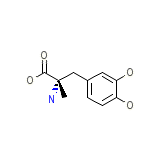Metformin HCL




Metformin HCL Brand names, Metformin HCL Analogs
Metformin HCL Brand Names Mixture
- No information avaliable
Metformin HCL Chemical_Formula
C10H13NO4
Metformin HCL RX_link
http://www.rxlist.com/cgi/generic2/methyl.htm
Metformin HCL fda sheet
Metformin HCL msds (material safety sheet)
Metformin HCL Synthesis Reference
No information avaliable
Metformin HCL Molecular Weight
211.215 g/mol
Metformin HCL Melting Point
300 oC
Metformin HCL H2O Solubility
1000 mg/L
Metformin HCL State
Solid
Metformin HCL LogP
-1.849
Metformin HCL Dosage Forms
Liquid for injection; Tablets for oral use (125 mg, 250 mg, or 500 mg)
Metformin HCL Indication
For use in the treatment of hypertension.
Metformin HCL Pharmacology
Methyldopa is an aromatic-amino-acid decarboxylase inhibitor in animals and in man. Only methyldopa, the L-isomer of alpha-methyldopa, has the ability to inhibit dopa decarboxylase and to deplete animal tissues of norepinephrine. In man the antihypertensive activity appears to be due solely to the L-isomer. About twice the dose of the racemate (DL-alpha-methyldopa) is required for equal antihypertensive effect. Methyldopa has no direct effect on cardiac function and usually does not reduce glomerular filtration rate, renal blood flow, or filtration fraction. Cardiac output usually is maintained without cardiac acceleration. In some patients the heart rate is slowed. Normal or elevated plasma renin activity may decrease in the course of methyldopa therapy. Methyldopa reduces both supine and standing blood pressure. Methyldopa usually produces highly effective lowering of the supine pressure with infrequent symptomatic postural hypotension. Exercise hypotension and diurnal blood pressure variations rarely occur.
Metformin HCL Absorption
Absorption from the gastrointestinal tract is variable but averages approximately 50%.
Metformin HCL side effects and Toxicity
The oral LD50 of methyldopa is greater than 1.5 g/kg in both the mouse and the rat. Symptoms of overdose include bloating, constipation, diarrhea, dizziness, extreme drowsiness, gas, light-headedness, nausea, severely low blood pressure, slow heartbeat, vomiting, and weakness.
Metformin HCL Patient Information
No information avaliable
Metformin HCL Organisms Affected
Humans and other mammals














